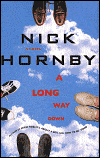 Nick Hornby's book debut, the memoir Fever Pitch (which has since been made into two movies) was quite good, and his follow up, the novel High Fidelity (made into another movie, one which equaled the quality of the book), struck gold. His next book, About a Boy (yep, another movie), was entertaining but not as moving. Then came How to be Good, which was ok but plodded for large chunks. With that unfortunate trend before it, I read A Long Way Down on my flight out to Portland. The premise is unusual and clever -- four rather different people become "friends" when they chance to all meet on the same London rooftop ready to commit suicide of New Years Eve. Martin is a former morning show host, who has recently been released from a stint in prison for having sex with a minor. Maureen is a devoutly religious single mother of a brain dead adult. Jess is 18 and depressed about being dumped, and (as we discover) about the disappearance of her older sister and the effect that has had on her family. JJ is an American who's all alone in London, his band having broken up and his girlfriend having dumped him. The story is told in the first person times four, with each main character lending her or his distinct voice to the chapters s/he narrates.
Nick Hornby's book debut, the memoir Fever Pitch (which has since been made into two movies) was quite good, and his follow up, the novel High Fidelity (made into another movie, one which equaled the quality of the book), struck gold. His next book, About a Boy (yep, another movie), was entertaining but not as moving. Then came How to be Good, which was ok but plodded for large chunks. With that unfortunate trend before it, I read A Long Way Down on my flight out to Portland. The premise is unusual and clever -- four rather different people become "friends" when they chance to all meet on the same London rooftop ready to commit suicide of New Years Eve. Martin is a former morning show host, who has recently been released from a stint in prison for having sex with a minor. Maureen is a devoutly religious single mother of a brain dead adult. Jess is 18 and depressed about being dumped, and (as we discover) about the disappearance of her older sister and the effect that has had on her family. JJ is an American who's all alone in London, his band having broken up and his girlfriend having dumped him. The story is told in the first person times four, with each main character lending her or his distinct voice to the chapters s/he narrates.Can a book about people who want to commit suicide maintain a sense of humor? To his credit, Hornby makes you laugh a number of times as you get to know the characters, mostly through the internal observations the characters make. Hornby has always had a knack for creating entertaining internal monologue -- he understands how to create a character in a way that lets the reader hear the character's distinctive voice via internal monologue. Given this talent, Hornby succeeds in making the first third of the book is pretty entertaining.
Sadly, however, Hornby decided not to make a novella, but a novel, and the remainder of the book bogs down. He wants the characters to grow, and to do so believably. He recognizes that real lives aren't going to be changed by miracles, and apparently he has learned since writing How to Be Good that people can only change so much (that defect being one of the reasons I didn't enjoy that book so much). Sadly, however, these characters aren't interesting/respectable/entertaining enough, and the amount of growth that takes place is too incremental. JJ is generally likeable, but his reason for suicide is so lame that even he realized it, and thus lied about it when it was his turn to tell the others why he was trying to kill himself. While Jess is entertaining at times, it seems like she's a puppet being jerked around from one behavioral extreme to another, rather than a believable individual. Martin has a decent reason to kill himself, i.e., his life is ruined, but there's so little redeeming about him, even by the end of the book, that I found it hard to care if he'd commit suicide. Only Maureen seems like enough of a human being, with enough reason to take her life, to respect and empathize with. However, she's only one-fourth of the book, which means that not only do you have to focus on the others most of the time, it also means that Hornby doesn't provide enough detail or nuance to her story. Perhaps her story can be fleshed out in the movie version (when I typed this, I thought I was being cute, but on a whim I looked it up and apparently not). Then again, that could be the explanation of this book's shortcomings -- maybe it's a draft of a screenplay rather than a well-developed novel.
Rating: 4/10
No comments:
Post a Comment